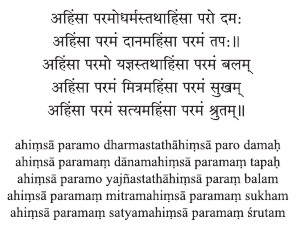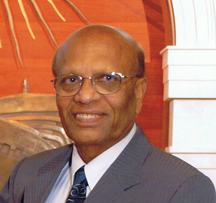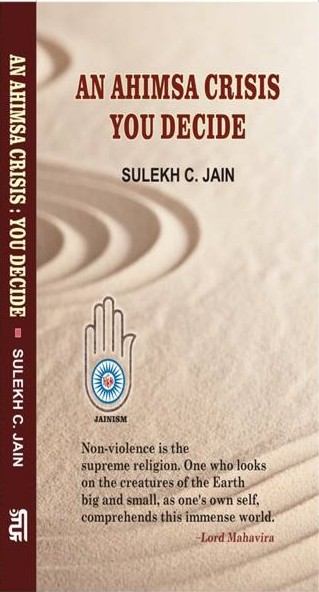A poem on ahimsa by Arjunan Subramaniam:
Light the flames of compassion,
In the altar of your hearts.
Unless hatred is answered with love,
Until forgiveness arises in the hearts,
The chain that binds you to life after life,
Will not be cut.
And finally,
“Thoughts on the Practice of Ahimsa by a Schoolteacher After the Newtown, CT, School Shooting,”
by Jessica Rubin, Teacher at Rocky Point High School, Middle Island, NY (originally shared as a blog post on December 17, 2012.)
“Tomorrow is my first day teaching after the tragedy in Connecticut, and tonight I cannot sleep. I am obsessively thinking about how to talk to my students– five full classes of sensitive, vibrant, unpredictable teenagers– about violence and tragedy, about life and death and love and humanity.
The easiest thing to do would be to move forward with the lessons I have planned about the books we are reading, books whose themes are relevant and important in moments like this. It is easier to talk about tragedy through the abstractions of fantasy and character. But, I know I must face the difficult reality of our world at this exact moment in time, even though it terrifies me.
I will tell my students I love them, and that the brave actions of the teachers who were killed protecting their classes did not surprise me.
As teenagers, they need more than love and reassurance, more than someone to promise that the dark is nothing to be afraid of. They are sophisticated thinkers, many of whom are on the precipice of great understanding and deep connections with themselves and the universe. I want to empower them to be forces of peace in a turbulent and violent society. I want hope to permanently illuminate their worlds, even now.
This summer, I studied nonviolence with a group of American teachers in India. Nonviolent philosophy has permeated my thinking since then, and I have become painfully aware of the levels of violence that exist in my everyday life.
It is unnerving and uncomfortable to admit how much violence exists around us, and the quantity of violent acts that each of us is complicit in by participating as spectators or non-objectors. By purchasing music that glorifies a violent lifestyle, clicking ‘like’ on a hateful Facebook post, or choosing to ignore hurtful words in the hallway, otherwise ‘nonviolent’ people accept and excuse violence in their environment. Ahimsa, the Sanskrit term for the traditional philosophy of nonviolence, requires abstaining from harmful actions, harmful speech, and harmful thoughts. It also requires practitioners to avoid celebrating the harmful acts of others, and to avoid being harmful to oneself and one’s surroundings.
We see a massacre of innocent children and know that it is violent, but we must learn to recognize the smallest acts of violence in our society before we can begin to rehabilitate our thoughts, speech, and actions toward a more peaceful existence.
It starts in calling things by their proper names, by using clear language instead of euphemisms. Violence of any kind causes suffering, and suffering will only lead to more violence. Hateful speech is violence. Bullying is violence. Laughing at the misfortune of others, even when they can’t hear you, is violence. Wishing for the suffering of others, even those who have done terrible things, is violence. If we want to have any hope of living peacefully, we must confront the volume of violence in our everyday lives and stop participating as perpetrators, observers, and consumers.
As human beings living in a violent culture, our violent reactions often feel justified. It takes bravery and self-awareness to acknowledge fear and anger and then react without hatred. The deeply rooted violence of culture cannot be stopped by more hatred, and reactive solutions will only delay the next tragedy.Yes, laws may change, and many laws probably should. But, the entrenched violence of a culture cannot be stopped by changes in legislation or harsher, more violent punishments for criminals. We cannot depend on politicians or celebrities to make our world what we want it to be; each one of us must take positive action to do that every day.
In order to turn the tide of violence in our country, we must commit to start with ourselves, our own thoughts, words, behaviors, and reactions, and we must hold ourselves honestly accountable. In order to stop the violence in the world around us, we must confront the violence we are a part of. And when we make mistakes, we must forgive ourselves as readily and truly as we will forgive others, and move on, and do better.
Although we may feel inundated by the helplessness that tragedy creates, each of us has tremendous power already within us. Lao Tzu said, ‘He who controls himself controls the world.’ Each moment we are alive is a chance to make the world more peaceful, and make ourselves more free.”
Beautiful lines on Ahimsa from the Mahabharata

Nonviolence is the supreme religion
Nonviolence is the supreme self-restraint
Nonviolence is the supreme donation
Nonviolence is the supreme penance
Nonviolence is the supreme worship
Nonviolence is the supreme strength
Nonviolence is the supreme friend
Nonviolence is the supreme bliss
Nonviolence is the supreme truth
Nonviolence is the supreme teaching
As shown earlier, humans are the most violent creatures/ animals.
Finally, we conclude this chapter with a classic text that reminds us the profound importance of ahimsa.
 Dr. Sulekh Chand Jain
Dr. Sulekh Chand Jain
